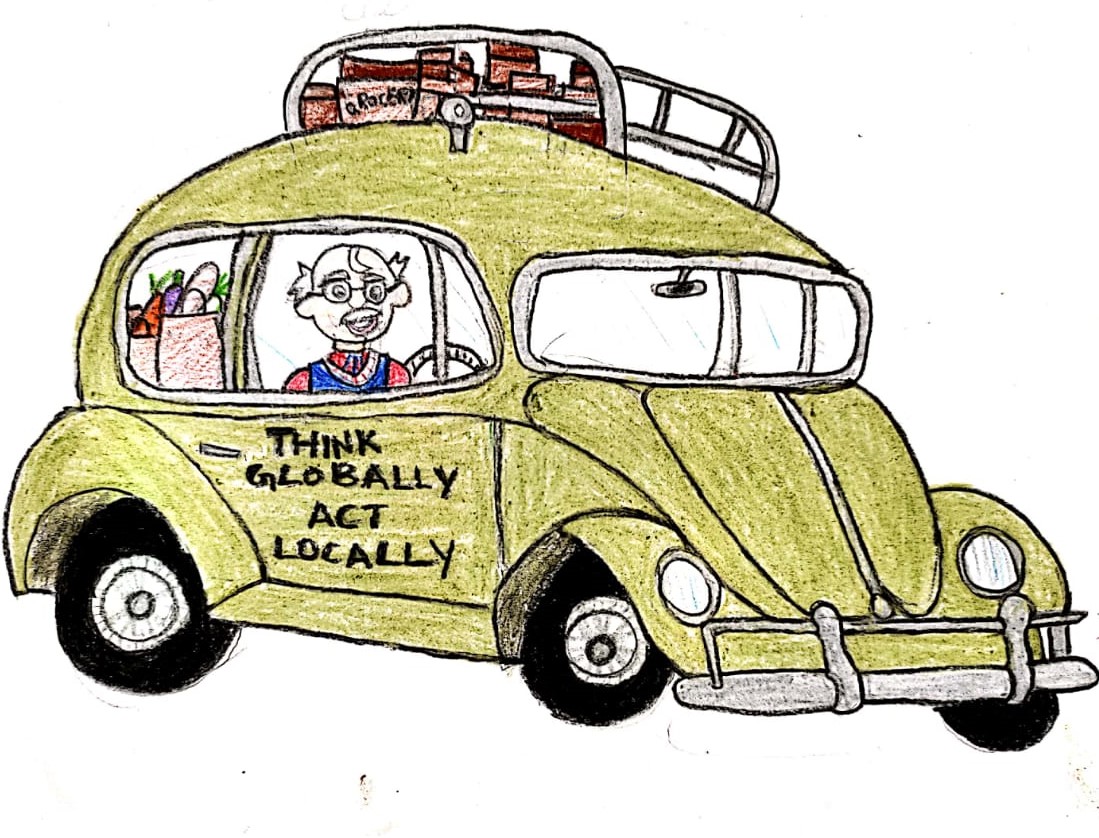Remains of an American Day

Toon by Saanvi Kudva
By Peter Kent
This year marks the 50th anniversary of Earth Day. It’s also the first time I put a bumper sticker on my car, a beat-up VW bug. I peeled off the backing, carefully eyeballed its straightness, and stuck on THINK GLOBALLY, ACT LOCALLY. Words to live by in 1970 and more so in 2020 if we are to manage the COVID-19 pandemic.
I am doing my part. I am staying home, denning up like a bear with furniture, a mobile phone, and the Internet. Keeping our distance from each other works to flatten the curve, avoiding a sharp rise of coronavirus cases, overwhelming doctors, nurses, hospitals, and medical supplies.
At street level, it looks like people are staying put. My city is a tourist favorite, nestled in the South’s Smoky Mountains. Millions of people enjoy outdoor activities along with the small shops, arts, food, and beer – there are more than two-dozen breweries in Asheville. Now the place is a ghost town. Some shops have put up wood panels over their windows. No tourists, no work, no money. We stay home and wait for word that it is safe to move about.
It is not total isolation. Rules let me leave for groceries, medicine, exercise, doctor visits, and other “essentials,” an eccentric list of things and activities including home maintenance items, vehicle upkeep, and alcohol purchases (vital). Those who are anxious about going out can have things delivered. Nor is it a lonely life. My wife and I use Zoom, a digital service that lets you see and talk with others. People working from home use it for meetings. The rest of us chat and hold virtual dinners and parties.
If this sounds idyllic, it’s because I’m white, well off, and retired. Quarantine feels a lot like retirement for us and for thousands of others who have come here to spend their senior years. For others, this is no Shangri-La. Tourism creates lots of modest-wage service jobs without health benefits. Small business owners, especially restaurants and bars, operate on a knife-edge between profit and loss. Prejudice is a problem. Minorities often feel left out of the area’s success. The same holds true for rural residents, who don’t share the city’s liberal values.
Asheville is not so different from other U.S. communities. What is happening here is repeated throughout the country. COVID-19 has unhinged America’s confidence. You know us Americans: Often wrong but never in doubt.
The pandemic is doing more than a test of our abilities to handle it. It is a revelation. Calamities do not build national character. They reveal it.
We are a nation that cherishes individual rights and distrusts government. Some see it as our greatest strength, others as our greatest flaw. It is the single greatest challenge to controlling COVID-19 in the United States. Public health threatens personal privacy. Contact tracing and patient monitoring will be fought, undermining efforts to isolate virus carriers and victims. Somehow, we must get the message out that interacting with people during this pandemic is like having sex: You’re not just having sex with your partner, you’re having it with every person your partner has had sex with. We learned that lesson with HIV-AIDS.
We are a nation that believes in its exceptionalism. Successes at the local level — city, county, state — will be blunted if the U.S. federal government will not cooperate internationally. COVID- 19 is no respecter of national boundaries. It has infected millions of people in more than 200 countries. Nations question our commitment to lead. The U.S. decision to cut off money to the World Health Organization has set off a search for new global leaders and sponsors.
We are a nation leery of science. When it comes to technology Americans are like diners in a fine restaurant, appreciative of the food but clueless to what goes on in the kitchen. The reasons for ignorance are many — lack of education, preference for quick answers, and anti-science provocateurs. Science can provide data to deal with the virus, but there must be political courage and intelligence to use it.
We are a nation that despite all its shortcomings is generous and caring. A day doesn’t go by when I don’t marvel at the self-sacrifice and generosity of doctors and nurses, emergency responders, cops, sanitation workers, delivery makers, food preparers, grocery clerks and everyone else who risks their health and family well-being to keep us from death’s door. Local groups form to feed the hunger and find shelter for the homeless. It is the best of this nation, its beating heart.
I keep this quote on my desktop: “You can depend upon the Americans to do the right thing. But only after they have exhausted every other possibility.”
I am hopeful.
Stay well.
Go well.
__________________________________________________________________
Peter Kent is a writer-journalist. He lives in Ashville, NC with his wife, Ellis, and their dogs Toby and Beebo.